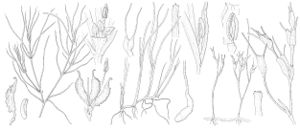Cymodoceaceae
Herbs, perennial, rhizomatous, caulescent; turions absent. Leaves submersed, alternate or nearly opposite, sessile; sheath persisting longer than blade, leaving circular scar when shed, not ligulate, auriculate, lobes not scarious; blade linear; intravaginal squamules scales, more than 2. Inflorescences axillary or terminal, solitary or cymes, without spathe, sessile or pedunculate; peduncle, when present, not elongating following fertilization, not spiraling. Flowers uniasexual, staminate and pistillate on separate plants; subtending bracts absent; perianth absent. Staminate flowers: stamens 2, in 1 series; anthers adaxially connate, dehiscing vertically; pollen linear. Pistillate flowers: pistils 2, distinct, not stipitate; ovules pendulous, orthotropous. Fruits achenelike or drupaceous. Seeds 1; embryo straight.
Distribution
Widespread in warm oceanic waters worldwide.
Discussion
Cymodoceaceae comprise one of three families of flowering plants in North America that inhabit oceanic waters. Individuals of this family form carpetlike vegetation over sandy to muddy substrates of the tropical and subtropical waters along the southern Atlantic and Gulf of Mexico coasts of the United States.
Genera 5, species 16 (2 genera, 2 species in the flora).
Selected References
Lower Taxa
Illustrations
| Family ⠉ | Taxon | Illustrator ⠉ | |
|---|---|---|---|
 | Zannichelliaceae Cymodoceaceae Cymodoceaceae | Zannichellia palustris Syringodium filiforme Halodule wrightii |
Key
| 1 | Leaves flattened; flowers solitary; styles not divided into stigmas; anthers attached at different levels on axis | Halodule |
| 1 | Leaves terete or semi-terete; flowers in cymes; styles divided into 2 stigmas; anthers attached at same point on axis | Syringodium |